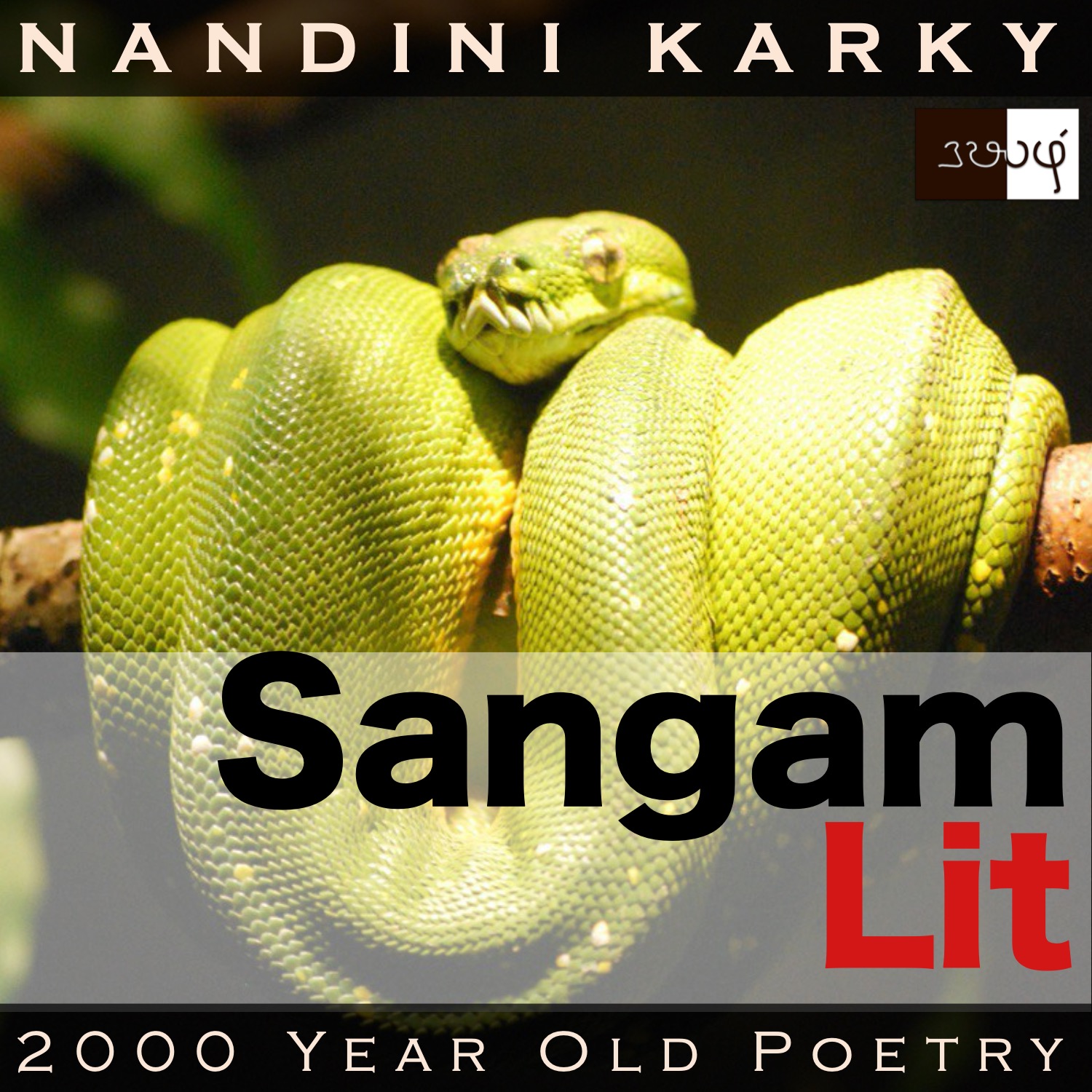Podcast: Play in new window | Download
Subscribe: Apple Podcasts | Spotify | Amazon Music | Android | iHeartRadio | TuneIn | RSS | More

In this episode, we perceive the dangers of traversing a mountain path at night, as portrayed in Sangam Literary work, Natrinai 261, penned by Senthan Poothanaar. The verse is set in the mountain country of ‘Kurinji’ and speaks in the voice of the confidante to the lady, passing on a subtle message to the man, listening nearby.
அருளிலர்வாழி-தோழி!-மின்னு வசிபு
இருள் தூங்கு விசும்பின் அதிரும் ஏறொடு
வெஞ் சுடர் கரந்த கமஞ் சூல் வானம்,
நெடும் பல் குன்றத்துக் குறும் பல மறுகி,
தா இல் பெரும் பெயல் தலைஇய யாமத்து,
களிறு அகப்படுத்த பெருஞ் சின மாசுணம்
வெளிறு இல் காழ் மரம் பிணித்து நனி மிளிர்க்கும்
சாந்தம் போகிய தேம் கமழ் விடர் முகை,
எருவை நறும் பூ நீடிய
பெரு வரைச் சிறு நெறி வருதலானே.
Opening with ‘அருளிலர்’, the poem arrives at the core straightaway, mentioning ‘he lacks kindness’. From our knowledge of Sangam poems this far, we can assume the subject of this sentence is the man. ‘மின்னு வசிபு’ talks about ‘the flashing of lightning’ and ‘அதிரும் ஏறொடு’ talks about ‘roaring thunder’. The phrase ‘தா இல் பெரும் பெயல்’ describes the ‘downpour’ as ‘flawless’. What a curious reference! Next, we glance at a striking phrase ‘களிறு அகப்படுத்த பெருஞ் சின மாசுணம்’. In this phrase, let’s first focus on ‘பெருஞ் சின மாசுணம்’. This refers to a ‘a large mountain snake’ found in those regions. The verb ‘அகப்படுத்த’ talks about some animal that was ‘swallowed’ by this mountain snake. In many other poems, we know the word ‘களிறு’ refers to a ‘male elephant’. Could it be true that this snake has swallowed an elephant entire? Or, is it a hyperbole employed by the poet to exaggerate the peril in the situation? At the same time, some texts indicate ‘களிறு’ could also refer to ‘the male of a wild boar’. That seems like a more probable prey! However, let’s pay tribute to the poet’s imagination and see the reference as a ‘male elephant’. The verse ends with ‘பெரு வரைச் சிறு நெறி வருதலானே’ meaning ‘as he walks the narrow path through the tall mountains’. Let’s explore more!
The man and lady had been leading a love relationship and the man had been trysting with the lady at night, for a while. The confidante perceives that he was not too intent on formalising the union. So, one day, when the man arrives to the lady’s house, pretending not to notice him, she turns to the lady and says, “He has no compassion, my friend. May you live long! As lightning flashes in the dark sky and thunder roars, thick clouds that can hide the radiant sun, traverse through tall peaks and then, dispersing into many, small groups, pour down impeccable rain in the midnight hour. The time, when a raging python, which has swallowed a male elephant, wraps around a thick tree, with no trace of softness, and grunts aloud as it tightens its grip. In such a place filled with sandalwood trees in the honey-fragrant mountain clefts, where the wild flowers of giant reeds extend out, he comes walking on a small path through the huge mountain. And, that is why I say so!” With these words, the confidante describes the dangers in the mountain path that the man traverses to see the lady at night and indirectly persuades him to seek the lady’s hand in marriage.
Now, for the nuances! The confidante opens with a bang indicating the man lacks compassion. But, she doesn’t explain the reason for her statement and instead, she goes on to talk about how thunder resounds and lighting flashes in the dark skies, and where thick clouds then disperse and pour down heavily on the peaks in that midnight hour. Then, she conjures a shudder-worthy image of a python, which has swallowed an elephant by day, twisting and turning around a thick tree, and digesting its prey. At this time, I’m reminded of the opening scene in the famous book ‘Little Prince’ about how a boy chides elders for not seeing an elephant swallowed by a boa, and instead calling the image as a hat. We shall not make that mistake for we’ll call this elephant an elephant!
Returning to the verse, the confidante mentions how the scene is unfolding near the mountain clefts, which abounds with sandalwood trees, spreading a honey-like fragrance and where flowers of giant reeds dance in the wind. And then, the confidante finally mentions the reason why the man is heartless, saying it’s because he chooses to walk on such a path through the mountains, without any consideration for their anxious hearts! Although the confidante seems to scold the man, like that subtle scent of sandalwood in the mountain clefts, she conceals the love and courage in his heart that makes him brave these dangers and also the love and care in the lady’s heart that makes her worry about the man’s welfare. This repeated theme that we have been encountering makes me wonder if such poems were written for some ancient competition, wherein poets gathered to portray their point of view, much like artists sketching on a specific theme. We see so many poems with the same theme and yet, as in this verse, these poems continue to intrigue us with striking images, such as that of a male elephant in the mouth of a mountain snake!




அருமை ????????????